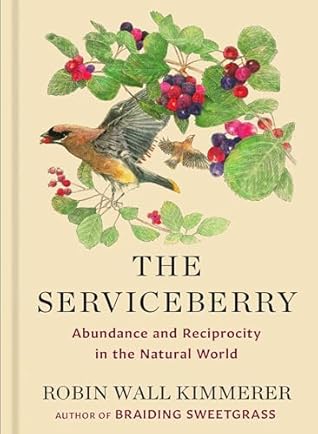More on this book
Community
Kindle Notes & Highlights
Read between
August 2 - August 9, 2025
Eating with the seasons is a way of honoring abundance, by going to meet it when and where it arrives.
Recognizing “enoughness” is a radical act in an economy that is always urging us to consume more.
Imagine the outcome if we each took only enough, rather than far more than our share. The wealth and security we seem to crave could be met by sharing what we have.
The relationships nurtured by gift thinking diminish our sense of scarcity and want. In that climate of sufficiency, our hunger for more abates and we take only what we need, in respect for the generosity of the giver. Climate catastrophe and biodiversity loss are the consequences of unrestrained taking by humans. Might cultivation of gratitude be part of the solution?
If our first response to the receipt of gifts is gratitude, then our second is reciprocity: to give a gift in return.
These processes are the models for principles of a circular economy, in which there is no such thing as waste, only starting materials. Abundance is fueled by constantly circulating materials, not wasting them.
Conceiving of something as a gift changes your relationship to it in a profound way, even though the physical makeup of the “thing” has not changed.
How we think ripples out to how we behave. If we view these berries or that spring as an object, as property, it can be exploited as a commodity in a market economy. When something moves from the status of gift to the status of commodity, we can become detached from mutual responsibility.
In a gift economy, wealth is understood as having enough to share, and the practice for dealing with abundance is to give it away. In fact, status is determined not by how much one accumulates, but by how much one gives away. The currency in a gift economy is relationship, which is expressed as gratitude, as interdependence and the ongoing cycles of reciprocity. A gift economy nurtures the community bonds that enhance mutual well-being; the economic unit is “we” rather than “I,” as all flourishing is mutual.
Those who have give to those who don’t so that everyone in the system has what they need. It is not regulated from above but derives from a collective sense of equity in “enoughness” and accountability in distributing the gifts of the Earth.
In a gift economy, the currency in circulation is gratitude and connection rather than goods or money.
The prosperity of the community grows from the flow of relationships, not the accumulation of goods.
Gifts are not meant to be hoarded, and thus made scarce for others, but given away, which generates sufficiency for all.


